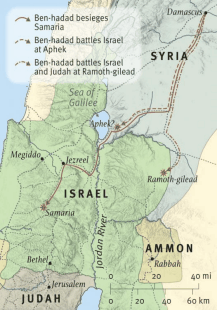Call of Elisha: 1 Kings 19:19-21:
Elijah found Elisha by Divine direction, not in the schools of the prophets, but in the field; not reading, or praying, or sacrificing, but ploughing. Idleness is no man’s honour, nor is ploughing any man’s disgrace… His heart was touched by the Holy Spirit, and he was ready to leave all to attend Elijah. It was a discouraging time for prophets to set out in. A man that had consulted with flesh and blood, would not be fond of Elijah’s mantle; yet Elisha cheerfully leaves all to accompany him. When the Saviour said to one and to another, Follow me, the dearest friends and most profitable occupations were cheerfully left, and the most arduous duties done from love to his name. May we, in like manner, feel the energy of his grace working in us mightily, and by unreserved submission at once, may we make our calling and election sure. – Mathew Henry Concise Commentary.
Elisha’s farewell to his family by breaking his plough and killing his oxen, so he won’t turn back. So, the farewell is not the farewell of crying, but a farewell of announcing his decision to God’s call. Elisha cut his ties with his old life.
1 Kings 20: Ahab war against Syria:
Ben-hadad: There are three Ben-Hadads recorded in the Bible.
1. Ben-Hadad, the father.
2. Ben-Hadad II, the son who was killed by Hazael (Chapter 20 and 2 Ki 6&7.
3. The 3rd Ben-Hadad was the son of Hazael (2 Kings 13:24)

V. 1: ….Ben-Hadad the king of Syria…thirty-two kings were with him….closed in on Samaria and fought against it. Ben-Hadad, king of Syria had the support of 32 kings.
Vs. 2-9: …. Ben-Hadad’s wanted to reduce Israel to a Slave status. Though his Term was accepted by Ahab, he refused later (5-9).
V. 13: ….A prophet came near to Ahab… As God told Elijah, there are other prophets in Israel still worship Jehovah.
Ahab won the intial battle according to God’s guidance (14-21).
Israel is to fight according to a divine battle plan that does not make much human sense (as in the case of Gideon in Judges 7). Theservants…are to initiate the battle (V.14)—young men unschooled in military matters, like the young and untrained David, who is also called a na‘ar in 1 Sam. 17:33 (a “youth,” in contrast to the warrior Goliath). The plan benefits from the fact that Ben-hadad is drunk as the Israelites approach (1 Kings 20:12, 16) and seemingly incapable of uttering coherent or sensible instructions (v. 18). – ESV Study Bible.
More war Vs. 22-25:
V. 22: “….Strengthen yourself….king of Syria will come up against you.” Prophet advised the king of Israel to strengthen and prepare for the war again in spring, which is the time for kings to go to war.
Vs. 23-25: Preparing to fight Israel in the plain by reorganizing, and strengthening his power as supreme over the other kings in his empire.
Ahab defeated Ben-Hadad again (26-34): ….
V. 28: God affirms that he will give Ahab the victory over the Syrians since they had spoken agains Him. So, the victory was not about Ahab, but about the pride of Syria and their wrong idea about God Jehovah.
Vs. 31-34: Ahab unwisely spared Ben-Hadad, an action that is similar of Saul’s sparing King Agag (1 Sam 15:19).
V. 35…Sons of the prophets: again, this is reference to the more prophets lived in Israel.
Vs. 36-42: Prophets message to king Ahab about his foolishness and the consequence. Ahab has released an enemy king whom God had devoted to destruction.